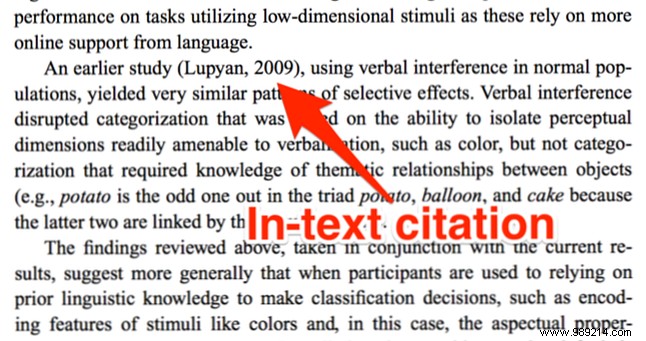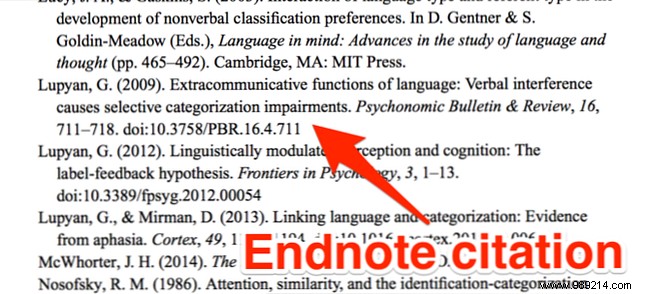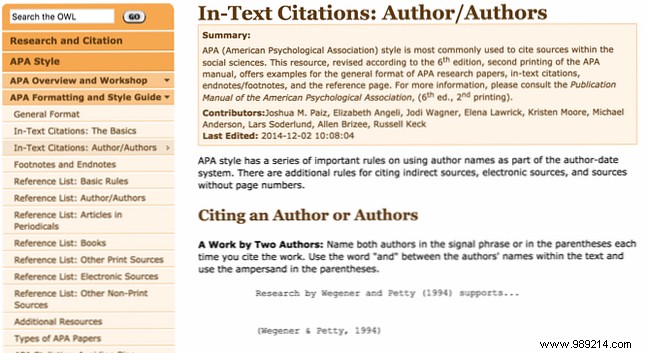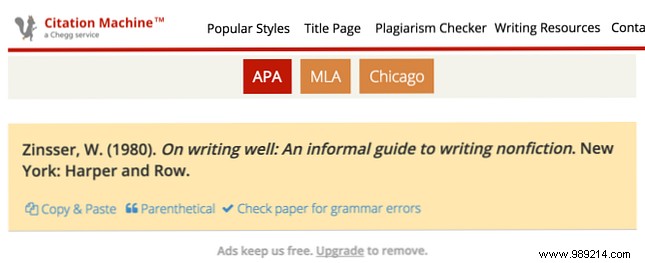“Be sure to cite your sources.” It's a phrase reminiscent of high school and college. And it usually earned a collective groan from the class. Dating is a pain. They are esoteric, time consuming and always seem to be in the wrong format.
And just because you've graduated doesn't mean you're done with them. Professional documents also need citations. Conference presentations, reports, and just about anything else that requires research. How To Organize Your Research With The Power Of Google Drive How To Organize Your Research With The Power Of Google Drive There are certain advantages to using Google Drive for your research work. It's free and available from anywhere, of course. Everyone who has a Google account has it by default. Tied to your Google account,... Read More It's unpleasant, but you have to do it..
To help you out, here's what you need to know about appointments, from what they are, to when you need them, to the basics of how to create them.
A citation is simply an admission that you got information from somewhere. You didn't invent it yourself through original research or reflection, you probably read it in a book or online. A citation shows your reader that you read the information somewhere else and tells them where they can find it.
That allows them to verify what you're saying or look it up for their own investigation. What they really want is not what they want, you have to do it anyway.

Citations generally consist of two parts:an in-text citation and an endnote. The in-text portion of the citation is a shortened version of the full citation:it allows the reader to find the full citation at the end of your document. It is often composed only of the author and the year of its source.
The format of both parts differs depending on the type of dating you are doing. Modern Language Association (MLA) citations differ from American Psychological Association (APA) standards, for example. The most popular citation styles are APA, MLA, and Chicago. Other styles include American Medical Association (AM), Harvard, Turabian (a variation on Chicago), and a host of other discipline-specific ones.

In general, MLA is used for works related to literature and humanities, APA is used for psychology and social science, and Chicago is used for business, history, and science. Note that this is very generalized, and make sure you're using the correct format for your particular project.
This is always a question on writers' minds. Fortunately, there is a simple answer, although you may not like it. You must cite any information that is not original or common knowledge. Determining what counts as common knowledge isn't always easy, but the MIT guidelines should help. They define common knowledge as follows:
When in doubt, cite your source. In many cases, you are writing for people who are not as knowledgeable in a particular field as you are, and they will benefit from your citations. If there's a chance they don't take what you write for granted, you should be citing your information.
If you use a direct quote, you will always need a quote. Information from an interview, email, or public broadcast must be cited. Periscope Video 10 Reasons Why You Should Be Using Periscope Now 10 Reasons Why You Should Be Using Periscope Now With so many different social networks, it's hard to know where to put your energy. But there are plenty of good reasons why you should give Periscope a try. Here are some. Read more ? Facebook Live? Cheep? Quote It You might think this sounds crazy, and sometimes it is, but it's part of a writer's integrity. If you are a student or a professional, you must correctly cite your information.
Once you've figured out what information you need to cite, you're ready to start making your citations. Going through the details of how to make each type of citation would take a lot of time, so I'll point you to the best resources and tools to create them.
First, you'll need to know exactly what information you'll need for your appointment. In general, you need all the information you can find. If it's a book, you'll need the title, author, publisher, city and date of publication, edition, and possibly the page numbers where you found your information. For an academic journal, the article name, author, publisher, publication date, and page numbers are required. A website citation usually needs the site name, URL, author name, publication date, and access date.

So where do you go to find out what information you need? The resource I used the most during my graduate years was Purdue's Online Writing Lab (OWL). Their Research and Citations section has many great answers, along with specific requirements for APA, MLA, Chicago, and AMA citation styles.
Let's say you were going to write an APA-style article. I would click on APA Style , then APA Formatting and Style Guide . From there, I can use the left sidebar to get information about the citations in both the text and the reference list (you'll need both). Start with the two sections called The Basics . From there, you can search for the specific type of resources you need to cite.

In my experience, this is the best way to learn how to cite sources. You can use tools that will automatically create them for you, and I'll list a few in a second, but it will take you longer to learn them that way. And learning them is worth it. Especially if you're getting a four-year degree or considering graduate school. It's a skill you'll need.
However, if you want a tool that automatically makes your appointments for you, that's one option. A citation manager will be your best option if you think you'll need to create a lot of citations, especially if you want to keep track of a large number of sources (for example, if you're in grad school).
EndNote is an industry standard when it comes to appointment management. Thomson Reuters maintains it, providing absolutely everything you need. The problem with EndNote, as you might have guessed, is that it's very expensive. A standard edition is $250, and buying a student edition through your university will probably cost more than $100. Check to see if your school has free or more affordable licenses to save some money.
EndNote also has a basic version that is cloud-based and free. That will probably be more feasible for most students and professionals. RefWorks and Mendeley are two other free options to help you keep your references organized. 3 PDF document management tools to organize your research. 3 PDF document management tools to organize your research. years. Let's discuss some tools that help you keep your library of PDF articles tidy and cataloged for use when you have... Read More All of these options will help you create citations in your preferred format and include them in your document.
If you'd rather not delve into the basics of these services to figure out how they work, a librarian can help. Not everyone has a librarian available, and if you need to look for tutorials on how to use a reference manager, there are plenty just a quick search away.
And if you want a very easy way to get a single appointment at a time, check out the Appointment Engine:

Choose your preferred citation style, enter as much information as you can, and it will give you your citation. Could not been more easy. It won't help you keep track of a lot of references as well as a reference manager, but it will save you a lot of time manually creating your citations.
OWL, EndNote Basic, and the Citation Machine are great resources for solving citation-related problems. And you're going to have some of those. But there are plenty of other great resources out there, and we want to hear about them.
Where do you go when you need help with dating? What formats do you tend to use? What tools have proven helpful in your writing? Share your thoughts and tips in the comments below!